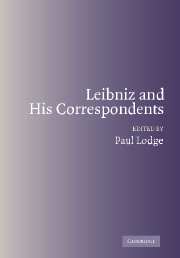Book contents
- Frontmatter
- Contents
- Contributors
- Abbreviations
- Acknowledgments
- 1 Introduction
- 2 Leibniz and His Master: The Correspondence with Jakob Thomasius
- 3 A Philosophical Apprenticeship: Leibniz's Correspondence with the Secretary of the Royal Society, Henry Oldenburg
- 4 The Leibniz–Foucher Alliance and Its Philosophical Bases
- 5 Leibniz to Arnauld: Platonic and Aristotelian Themes on Matter and Corporeal Substance
- 6 Leibniz and Fardella: Body, Substance, and Idealism
- 7 Leibniz's Exchange with the Jesuits in China
- 8 Leibniz's Close Encounter with Cartesianism in the Correspondence with De Volder
- 9 “All the time and everywhere everything's the same as here”: The Principle of Uniformity in the Correspondence Between Leibniz and Lady Masham
- 10 Idealism Declined: Leibniz and Christian Wolff
- 11 On Substance and Relations in Leibniz's Correspondence with Des Bosses
- 12 “[…] et je serai tousjours la même pour vous”: Personal, Political, and Philosophical Dimensions of the Leibniz–Caroline Correspondence
- References
- Index
4 - The Leibniz–Foucher Alliance and Its Philosophical Bases
Published online by Cambridge University Press: 02 September 2009
- Frontmatter
- Contents
- Contributors
- Abbreviations
- Acknowledgments
- 1 Introduction
- 2 Leibniz and His Master: The Correspondence with Jakob Thomasius
- 3 A Philosophical Apprenticeship: Leibniz's Correspondence with the Secretary of the Royal Society, Henry Oldenburg
- 4 The Leibniz–Foucher Alliance and Its Philosophical Bases
- 5 Leibniz to Arnauld: Platonic and Aristotelian Themes on Matter and Corporeal Substance
- 6 Leibniz and Fardella: Body, Substance, and Idealism
- 7 Leibniz's Exchange with the Jesuits in China
- 8 Leibniz's Close Encounter with Cartesianism in the Correspondence with De Volder
- 9 “All the time and everywhere everything's the same as here”: The Principle of Uniformity in the Correspondence Between Leibniz and Lady Masham
- 10 Idealism Declined: Leibniz and Christian Wolff
- 11 On Substance and Relations in Leibniz's Correspondence with Des Bosses
- 12 “[…] et je serai tousjours la même pour vous”: Personal, Political, and Philosophical Dimensions of the Leibniz–Caroline Correspondence
- References
- Index
Summary
To those who think of Leibniz as a dogmatic philosopher, his close association with a sceptic such as Simon Foucher may come as a surprise. Thus, in a characteristically ground-breaking article, Richard Popkin remarks that it was “strange but nevertheless a fact that Leibniz was a warm and close friend of the three leading French sceptics of his time, the abbé Simon Foucher, Bishop Pierre-Daniel Huet and Pierre Bayle” (1966: 228). Popkin's investigation into how such an accord could be maintained between such apparently contrary types of philosopher led him to acknowledge that Leibniz, after all, was not as far from the sceptics as is commonly supposed. And on this point, on which I will have more to say, I agree with him. But, at least as far as Foucher goes, another part of the explanation is that someone may call himself a sceptic because he is committed to the search after truth and not, as Popkin supposes, because of an inclination to doubt everything. In fact, or so I will argue, Foucher and Leibniz agreed about a good deal and, for a while, thought they agreed even more, about philosophical matters. There was, as the title of my chapter claims, an alliance between them. And this alliance had, or appeared to each of them to have, substantial philosophical bases.
- Type
- Chapter
- Information
- Leibniz and his Correspondents , pp. 74 - 96Publisher: Cambridge University PressPrint publication year: 2004

